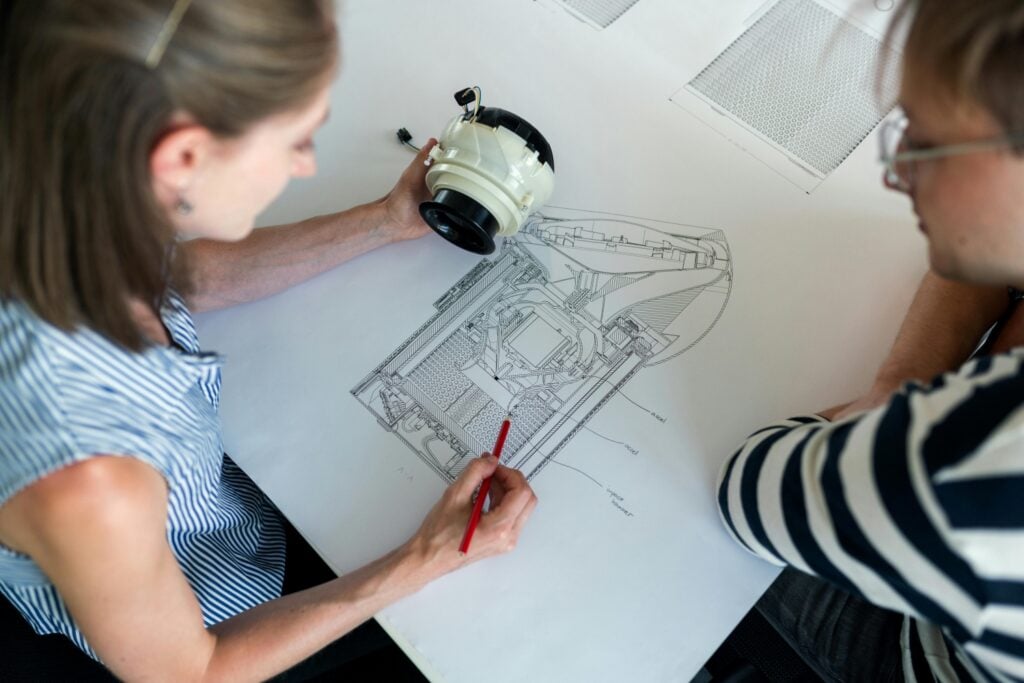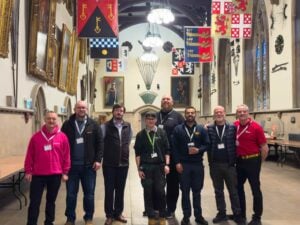After earning a degree in Zoology with the expectation of becoming a Wildlife Conservationist, Charis realised she wanted a more creative and practical career.
Through her Apprenticeship at Cecco, she has gained hands-on experience, discovered a love for problem-solving and found a path where she can build things that matter.

We caught up with her to learn more about her unique path into Engineering:
Why I chose Engineering
Before starting my apprenticeship, I already had a degree in zoology and a Master’s-level certificate. My original plan was to move into Wildlife Conservation because I was had always been interested in the natural world and animal behaviour, I wanted to help protect species and their environments.
After completing my Masters, I accepted a job in pharmaceuticals and found myself dabbling in CAD design, and although I enjoyed aspects of the role, especially the creative and problem-solving elements, I felt something was missing. I didn’t want to sit behind a desk all day; I wanted to build things, contribute to real projects and use my hands as much as my head.
That’s what drew me to engineering. I loved the idea of making something tangible that solves a problem or serves a real purpose. I’d had already had a taste of this, and knew I wanted more of that. I craved work that was practical and creative, not just theoretical.
When I discovered the Apprenticeship, it felt like the perfect fit. Cecco makes modular furniture, stages and tables for professional settings like schools, hotels and events. They’re all about smart, efficient design which is what I like. I’ve now been there for six months and feel like I’m just getting started. It’s a steep learning curve, especially having to deal with maths and technical theory, but every day brings something new.
My thoughts on Apprenticeships
Coming back into education after University was both familiar yet challenging. I’ve always been better with coursework than exams, so managing the academic side hasn’t been too daunting, but combining it with full-time work is no joke. Balancing deadlines, studying, and actual job responsibilities takes real effort. That said, I’ve found the structure of an apprenticeship incredibly rewarding.
What sets apprenticeships apart from traditional study is the immediate real-world application. When I learn something at College, whether it’s about pneumatics, CAD, or electronics, I can often try it out at work soon after. That crossover helps solidify my learning and makes it feel more relevant. It also keeps me engaged, we’re not just learning theory; it’s hands-on and can have an immediate impact on my work.
One of the biggest benefits is the experience itself. After University, I struggled to get into roles because I didn’t have hands-on skills. Now, I’m gaining practical abilities in everything from welding and CAD modelling to redesigning real parts and troubleshooting manufacturing issues. It’s helped me understand how a design works not just on screen, but in the real world, with all the potential constraints and limitations. For that reason, I’d absolutely recommend an apprenticeship.
What’s next
Looking ahead, I hope to be someone the company can rely on to take a product from concept through to completion, someone who can deliver a project that matches spec and functions perfectly.
After I’ve finished the apprenticeship, I’d stay on at Cecco if the opportunity is there. The work interests me, and I feel connected to the products we create. I’d love to design something used in film or live performance. Just knowing a piece of equipment that I helped build ended up on stage somewhere would be amazing. But If the right role came up elsewhere, I’d be open to it – but I definitely want to stay in this field.
Down the line, I think it could also be really interesting to combine my original interest of conservation to create something that helps the environment but also serves a practical purpose.
Women in STEM
It’s true engineering is still very male-dominated. There’s still a long way to go, but I do think this is slowly changing. Platforms like TikTok have opened up new ways to learn, and I’ve seen so many women sharing educational, inspiring content about engineering – fixing things, building projects, or showing what a day in their job looks like. It’s empowering, especially for younger women thinking about their futures.
I think it’s important to show that women have always been capable, it just not always been encouraged or we haven’t been included. But there’s a growing sense of independence among women now. We want to know how to fix our own cars, put up shelves, or take on tasks that traditionally weren’t “ours.” The idea that women don’t want to get their hands dirty is outdated. But I think more inclusive environments, updated regulations and public visibility are helping to remove those old barriers and prejudice.
That said, there are still challenges. I’ve heard the occasional misogynistic remark, nothing serious, but it still shows there’s an underlying bias in STEM subjects. I tend to brush it off, but that doesn’t mean it should be happening. Culture is slow to change, but it is changing which is good.
My belief is simple: people should do what they enjoy, regardless of gender. The more we normalise that, the more balanced this industry will become.
All skills are useful
One of the things that’s really surprised me is just how many of my past experiences have turned out to be useful, even if they seemed unrelated at the time.
For example, I did a lot of Excel work in my role at the pharmaceutical company, and that’s been really helpful during the apprenticeship. I also have a prior experience of writing reports and managing projects, which made it easier to get to grips with things like documentation and planning. Even understanding how different departments interact has helped me see how engineering projects fit together as a whole, it’s not just about doing your bit, but about how everything connects.
I’m also learning so many new things now that I know will be useful in the future, wherever I end up. Engineering is such a broad field, and everything you learn will come in handy in some way. For example, I’m the only Apprentice studying CAD, so I’ve been learning alongside the Maintenance Operations Apprenticeships at College. Because of this I’ve learned about pneumatics, motors and hydraulics – all things I wouldn’t expect to learn for CAD, but that has actually made my designs better because I have a wider understanding of different elements and how they’ll be used in the real world.
The key thing I’ve learnt during all of my years of education is regardless of where you’re at in life, the skills you’re building can end up taking you in all sorts of directions later on.
My advice for new Apprentices
If you’re just starting your apprenticeship, I’d say the most important thing is to be open with your tutors and your employer. Make sure you let your employers know what you’re learning at College and vice-versa so that they can bridge the gap between the theory and practical application. If you can connect what you’re learning at College to what you’re doing at work, it’ll make the learning feel more relevant and help it stick.
I’d also say explore hobbies that support your course. If you’re into electrical stuff, try picking up something like an Arduino. If you’re doing CAD, see if you can get the software at home and just play around with it. I did a lot of YouTube tutorials when I first started and honestly, trial and error taught me so much.
Don’t be afraid to ask for help, whether it’s for more resources from your tutor or a bit of guidance from a colleague. I’ve learnt that you really don’t need to have all the answers straight away. Asking questions shows you’re engaged and eager to learn, and that’s what really helps you grow. Just give yourself time and space to take everything in. It can be a big adjustment, especially balancing work, study and everything else, but it’s worth it. You’re building real-world skills and a career at the same time so just take it one step at a time.
Has Charis and her change of career inspired you to follow a new passion?
Consider studying an Apprenticeship today.


